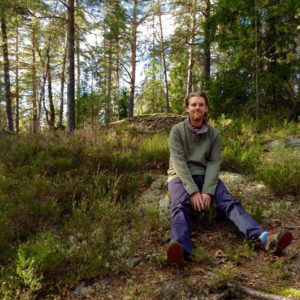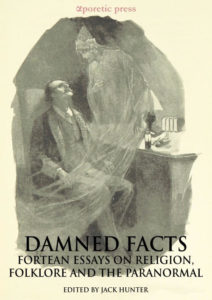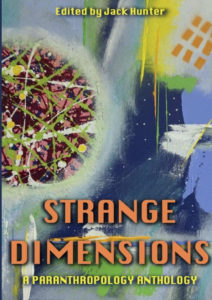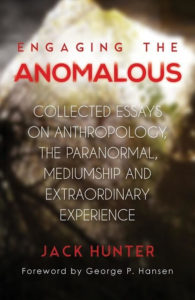
It gives me great pleasure to announce that Dr. Jack Hunter has been appointed our newest Research Fellow, joining Drs. Carlos Alvarado, Kathy Dalton, James Matlock and Nancy Zingrone in that capacity. We have been proudly following Jack’s academic career since he was awarded the 2010 Eileen J. Garrett Scholarship and a subsequent grant to help pursue his studies. We have long been fans of his Journal of Paranthropology and have shared a portion of Eileen Garrett’s “Haitian Diary” with him for publication.
What follows is a statement prepared by Dr. Hunter:

“My research has primarily been centered around the anthropology of religion, the anthropology of consciousness and the intersections between anthropology and parapsychology. More recently my research has found a resonance with theoretical developments in anthropology’s so-called ‘ontological turn.’ In particular my research has focused on an ethnographic study of a group of contemporary trance mediums in Bristol with the aim of developing a non-reductive anthropological approach to anomalous and religious experience. I am particularly interested in methodological and theoretical issues surrounding the social scientific study of the paranormal, and in exploring new theoretical and methodological possibilities.
My doctoral thesis consists of an ethnographic study of contemporary trance and physical mediumship at a non-denominational Spiritualist home-circle in Bristol, UK, known as the Bristol Spirit Lodge. The research explores themes of personhood (how experiences of trance mediumship for both mediums and sitters affect the development of models and conceptions of the self), performance (how the body is used during spirit mediumship performances to manifest the presence of disembodied, deceased, personalities), and how spirit mediumship performances and experiences influence participants’ conceptualizations of the mind-body relationship. In essence this research examines some of the experiential foundations for the belief in the survival of bodily death, the afterlife and expanded conceptions of self, based upon ethnographic observations and interviews with mediums, the spirits they embody and regular participants in séances.
Home-circles for the development of trance mediumship (which have recently seen an increase in popularity), represent an active effort to explore the extents and limitations of consciousness (including the boundaries between life and death — ʻtranceʼ — ʻtransireʼ — ʻto go acrossʼ), and provide an opportunity for participants to define for themselves the nature of human personhood and consciousness based upon first-hand experimentation. Scientific debates over the nature of consciousness and its relation to the physical body (including whether consciousness can survive the death of the body), have never been more culturally pervasive, and are intimately connected with the perceived opposition of science and religion that currently dominates mainstream Western culture. Groups such as the Bristol Spirit Lodge operate at the borderlands of both science and religion, and are an example of how this contemporary debate is played out in the field, away from academic institutions.
Some of the key concepts that emerge from the Lodgeʼs experimental process of consciousness exploration include the notion that aspects of consciousness are immortal and that the dead continue to exert an influence on the living after the death of the physical body, the idea that the body and self are porous rather than rigidly bounded, perhaps best understood in terms of fields, and an understanding that consciousness is a fundamental property of matter (panpsychism), rather than a by-product of physiology (as the dominant materialist philosophy suggests), so that some form of survival of consciousness is to be expected.
One area that the research project focuses on specifically is the frequently assumed distinction between so-called ‘Westernʼ (Individual) and ‘Non-Western’ (Dividual) models of the self. This research suggests that this classical distinction is overly simplistic, with practices such as trance mediumship in Western cultures leading to the development of models of the self that would usually be considered ‘Non-Western.’ This points towards a much greater degree of intra-cultural variation in self-concepts within contemporary Western cultures than has hitherto been described and, moreover, suggests that the sense of self derives as much from experiential factors as it does from cultural influences.
 In addition to these areas of inquiry, the research also seeks to develop a methodological and theoretical approach to the so-called ‘paranormal’ (a category into which the concepts of ʻafterlifeʼ and immortalityʼ frequently fall), that does not aim to explain away, or reduce the experiences and folk-theories of research informants (which has been the dominant attitude toward such phenomena and experiences within mainstream academia), but that instead critically engages with them in an open-minded and empathetic fashion, drawing on the ethnographic approach of anthropologists of religion such as Edith Turner (immersive participation) and Fiona Bowie (cognitive empathetic engagement), in an effort to understand how they impact peoples’ understanding of the cosmos and their role within it. As a part of this area of inquiry I have developed the notion on ‘ontological flooding.’ Although I have arrived at this position through a different lineage of scholars, it nevertheless intersects with the recently emergent ontological turn in anthropology.
In addition to these areas of inquiry, the research also seeks to develop a methodological and theoretical approach to the so-called ‘paranormal’ (a category into which the concepts of ʻafterlifeʼ and immortalityʼ frequently fall), that does not aim to explain away, or reduce the experiences and folk-theories of research informants (which has been the dominant attitude toward such phenomena and experiences within mainstream academia), but that instead critically engages with them in an open-minded and empathetic fashion, drawing on the ethnographic approach of anthropologists of religion such as Edith Turner (immersive participation) and Fiona Bowie (cognitive empathetic engagement), in an effort to understand how they impact peoples’ understanding of the cosmos and their role within it. As a part of this area of inquiry I have developed the notion on ‘ontological flooding.’ Although I have arrived at this position through a different lineage of scholars, it nevertheless intersects with the recently emergent ontological turn in anthropology.
My research also fits comfortably into an emerging trend within the humanities more generally of taking the ‘paranormal’ seriously as an area of valid social research, perhaps best exemplified by the recent work of historian of religion Jeffrey J. Kripal, and the experientially grounded approach to the study of supernatural beliefs advocated by folklorist David J. Hufford.
My research has relevance to social anthropology, parapsychology, cross-cultural psychology, religious studies, performance studies, the anthropology of religion, the anthropology of consciousness, and comparative psychical research (paranthropology).
I am currently investigating the connections between anomalistics and ecology. I am a regular spokesperson for parapsychological themes on radio and podcasts, and am active in publishing in both academic and popular spheres.”
 Reading the above you can appreciate Jack is a great “fit” to represent Parapsychology Foundation as one of our Research Fellows. His publications are on the shelves of the Garrett Library and we eagerly await more of his research findings.
Reading the above you can appreciate Jack is a great “fit” to represent Parapsychology Foundation as one of our Research Fellows. His publications are on the shelves of the Garrett Library and we eagerly await more of his research findings.
On behalf of the Parapsychology Foundation family, Welcome aboard, Jack!